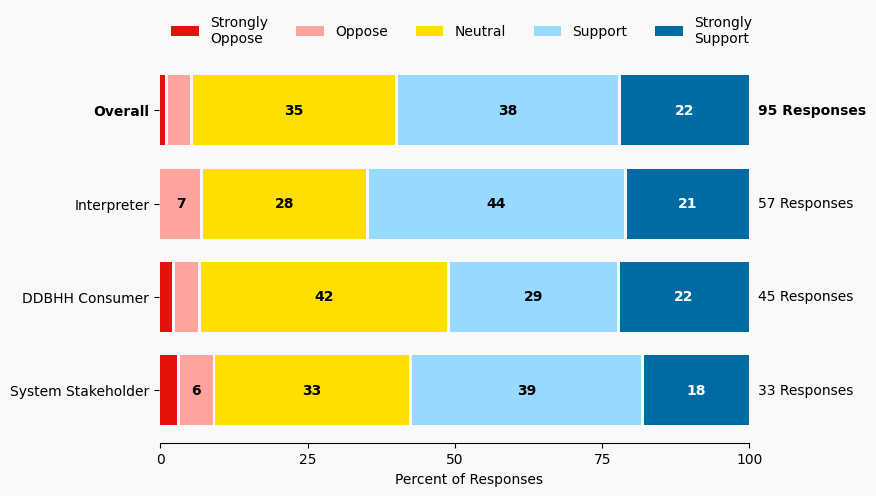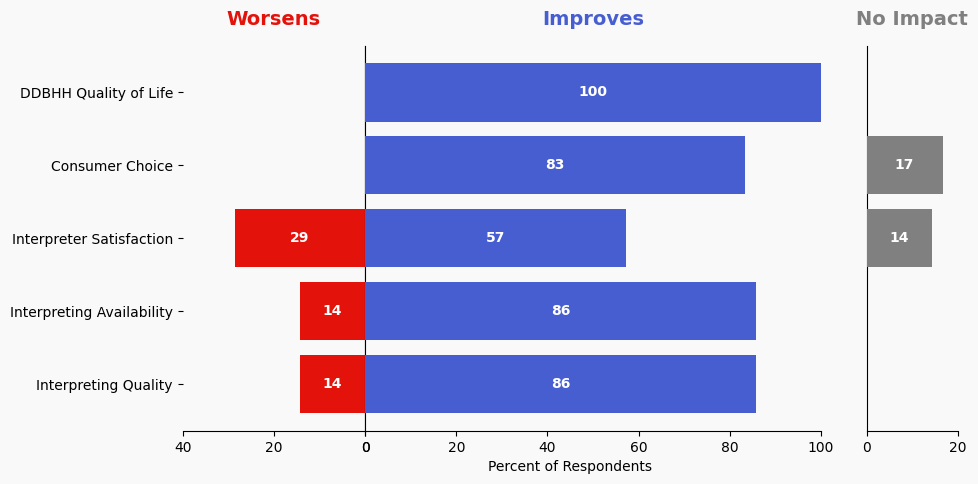86 Promote Texas’ BEI Court Certification to Demonstrate Qualifications to Interpret in Court and Legal Settings
Issue: Insufficient number of qualified interpreters for legal interpreting. The RID SC:L is no longer offered.
Proposed Solution: Coalition, with Minnesota Judicial Branch leading, promote the need for highly qualified court interpreters by practicing their published policy of prioritizing the qualifications of interpreters as follows: RID SC:L BEI Court Legally qualified interpreters as demonstrated by a training and/or experience portfolio (This process has not yet been developed. Recommend this be referred to an Interpreter Advisory Committee. See 83 – Advisory Committee) Court rostered interpreters As RID’s Specialist Certificate: Legal is no longer being offered, it is dificult for interpreters to demonstrate their qualifications for court interpreting. If the courts pay more to BEI Court Certified interpreters and schedule following this prioritization, there will be incentive for working interpreters to attain this certification.
Expected outcome: DDBHH Minnesotans will experience justice more on par with their hearing peers as more interpreters are able to demonstrate proficienty for interpreting in court and legal settings. Note: If interpreters are challenged to afford the travel and testing needed to take the BEI generalist and then BEI Court credentials, the coalition partners with MJB to seek scholarship funds to support interpreters seeking the BEI Court credential. See #100 for generalized BEI scholarship fund.
Who is impacted: Consumers, court interpreters
Timeline: 6 months

Summary of Support Image Description
The stacked bar charts show how respondents rated their level of support and the total number of responses. The percentage for the five support levels is shown from left to right: Strongly Oppose (Dark Red), Oppose (Light Red), Neutral (Yellow), Support (Light Blue), and Strongly Support (Dark Blue).
Respondents may identify with multiple subgroups. The overall level of support is:
Overall
Strongly Oppose: 1%
Oppose: 4%
Neutral: 35%
Support: 38%
Strongly Support: 22%
Click to see the detailed image description for each subgroup.
Interpreter
Strongly Oppose: 0%
Oppose: 7%
Neutral: 28%
Support: 44%
Strongly Support: 21%
DDBHH Consumer
Strongly Oppose: 2%
Oppose: 4%
Neutral: 42%
Support: 28%
Strongly Support: 22%
System Stakeholder
Strongly Oppose: 3%
Oppose: 6%
Neutral: 33%
Support: 39%
Strongly Support: 18%
Overview of Respondents Opting for In-Depth Solution Analysis
After indicating their support level, 3% of the 95 respondents opted in to further assess whether the solution would worsen or improve on five metrics. Of the opt-in reviewers (3 respondents), 0% supported the solution, 66% were neutral on the solution, and 33% opposed the solution.
The remaining 92 respondents did not opt in to further assess the solution. Of these people, 61% support the solution, 33% were neutral on the solution, and 4% opposed the solution.
Reviewer Evaluation of Solution Effectiveness

Solution Effectiveness Image Description
The stacked bar charts show how respondents assessed the effectiveness of this solution based on five metrics. For each metric, the percentage of respondents is shown from left to right: Worsens (Red), Improves (Blue), No Impact (Gray).
DDBHH Quality of Life
Makes It Worse 0%
Makes It Better 100%
No Impact 0%
Interpreter Satisfaction
Makes It Worse 28%
Makes It Better 57%
No Impact 14%
Consumer Choice
Makes It Worse 0%
Makes It Better 83%
No Impact 16%
Interpreting Availability
Makes It Worse 14%
Makes It Better 85%
No Impact 0%
Interpreting Quality
Makes It Worse 14%
Makes It Better 85%
No Impact 0%
Reviewer Feedback and Insights
Interpreter
One comment from Interpreters supports recognizing Texas’ BEI Court Certification but acknowledges that it may not be the only solution, highlighting Minnesota’s need to recognize BEI credentials like other Midwest states. Another comment questions whether BEI is the right solution and suggests bringing back RID’s SC:L, noting the additional burden of BEI legal CEU requirements.
Deaf, DeafBlind, Hard of Hearing
One comment from DDBHH Consumers suggests having a quality specialist perform a critical evaluation of BEI Court Certification and RID’s SC:L to gain a deeper understanding of how interpreters are evaluated, identify any existing barriers within the state-level court system, and pinpoint areas for improvement in interpreter quality. Another comment stresses the need to document interpreters, including CDIs, who can provide court interpreting services.
System Stakeholder
One comment from a System stakeholder recommends an assessment of both BEI Court Certification and RID’s SC processes to improve interpreter quality and ensure fairness in legal settings.
PREVIOUS SOLUTION
Issue: Rule 8 is a policy that requires court scheduling staff to attempt to schedule SC:Ls first. Currently, not all scheduling staff follow Rule 8, thus resulting in any interpreter on the roster or through a subcontracted agency being sent for court proceedings.
NEXT SOLUTION
87 Study Court Interpreter Program Compensation Practices
Issue: Minnesota Judicial Branch (MJB) Court Interpreter Program has recently changed their compensation practices, making court interpreting less appealing to interpreters. This negatively impacts DDBHH Minnesotans in court proceedings as well as court mandated classes, meetings, therapy and training.
Leave a Reply